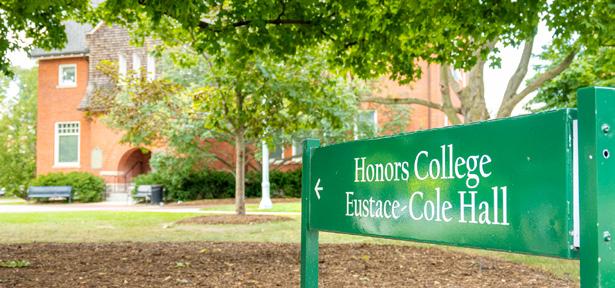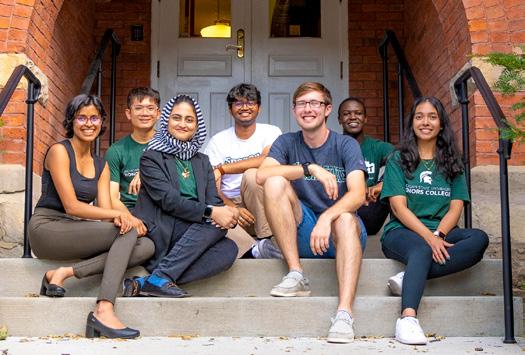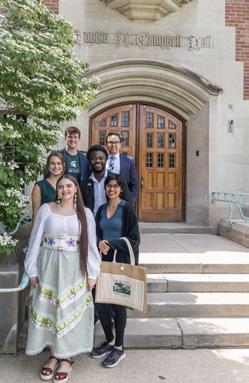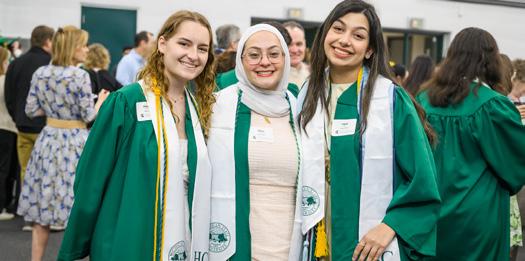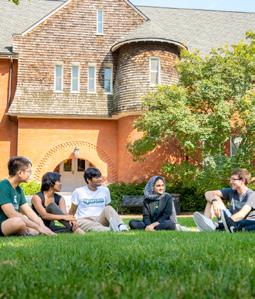Why Consider the Honors College at MSU?
The Honors College offers the next dean a vibrant, collaborative, and student-centered environment supported by a deeply committed team of faculty and staff.
Key attractive features include:
■ A strong and engaged student body that actively participates in campus, national, and global initiatives.
■ A tightly knit and collaborative community, including a dedicated team of honors advisors and administrators.
■ A rare opportunity to shape and elevate a nationally respected honors program and extend its reach and impact across the university.
■ The chance to lead in the context of MSU’s land-grant mission, supporting access, excellence, and social impact.
Opportunities and Challenges for the Next Dean
OPPORTUNITIES
■ Opening of Campbell Hall and the potential to co-create a living-learning model for Honors students.
■ Engagement in the Spartan Global Learning Initiative, part of MSU’s GenEd modernization, with opportunities to integrate global learning outcomes and advocate for inbound international students.
■ Re-engaging faculty across colleges in honors pedagogy, mentorship, and interdisciplinary programming.
■ Building upon the Honors College’s outstanding national reputation by leading strategic efforts to recruit exceptional students from across the country and around the world.
■ Expanding research opportunities for students beyond their first two years.
■ Expanding global recruitment and increasing visibility of MSU’s Honors College.
■ Retooling the Honors College Strategic Plan to align with new institutional priorities.
Challenges
■ Innovative fundraising, including naming opportunities and developing sustainable support for programs.
■ Creative and strategic ways to expand academic offerings for Honors students in a decentralized model.
■ Strong cross-campus collaboration and incentivization of faculty participation in honors education.
Key Priorities for the Next Dean
■ Uphold and champion the land-grant mission of MSU and inclusive excellence, especially in a challenging political and higher education climate.
■ Elevate the profile of the Honors College both internally and externally.
■ Lead strategic planning and guide the implementation of a refreshed vision.
■ Strengthen the integration of global and interdisciplinary learning experiences into the student journey.
■ Build upon and expand opportunities for faculty collaboration, student mentorship, and undergraduate research.
Key Characteristics, Competencies, and Experience
The successful candidate will demonstrate the following:
■ Innovative Thinker – Able to generate new ideas, challenge norms, and find novel solutions to emerging challenges.
■ Ethical and Transparent – Operates with integrity, openness, and a commitment to accountability.
■ Bridge Builder – Skilled at cultivating relationships and building trust across departments, colleges, and constituencies.
■ Academic Bridge-Builder – Understands the value of collaboration across the sciences, arts and humanities and supports integrative learning.
■ Student-Centered – Demonstrates compassion and care for students as whole individuals.
■ Engaged and Approachable – Engaged and visible in the student and faculty community; committed to listening and responsiveness.
■ Innovative and Adaptive – Willing to think “outside the box” and pursue bold initiatives that align with student and university needs.
Professional Qualifications
■ Current tenured appointment at the rank of associate or full professor at Michigan State University.
■ Demonstrated academic leadership experience and success in roles that support student engagement, interdisciplinary collaboration, or faculty development.
■ A strong record of teaching, research, and service consistent with the expectations of a tenured faculty member.
Application Process
Nominations and applications are encouraged from tenured faculty at Michigan State University. Interested candidates should confidentially submit a curriculum vitae, and a letter of interest (Adobe PDF files preferred). Materials should represent qualifications relative to the opportunities and challenges described in this document. In your letter of interest, please describe how your experience related to the key responsibilities outlined in the candidate profile. Share your vision for the Honors College and specifically, discuss how you would foster an inclusive, student-centered environment that supports academic excellence, interdisciplinary learning, and engagement.
For fullest consideration, materials should be received as soon as possible and preferably by July 25, 2025. Applications can be submitted on the MSU Careers website via this link.
Professional references will be requested from finalists selected for further consideration.
In compliance with the law, Michigan State University is an equal opportunity employer. University programs, activities, services and facilities are provided without regard for a person’s age, color, gender (including gender identity and gender expression), genetic information, disability status, ethnicity, height, marital status, national origin, political persuasion, race, religion, sex (including pregnancy, sexual orientation), military or veteran status, or weight or any other status protected by applicable federal or state law. In carrying out this commitment, the university is guided by the applicable federal and state laws and regulations and policies adopted by the Board of Trustees.
Contact
The Office for Faculty and Academic Staff Affairs (FASA)
Kathy Charles, MHRLR
Sr. Director Faculty and Academic Staff Affairs lewlessk@msu.edu
D EAN OF THE H O NORS COLLE
